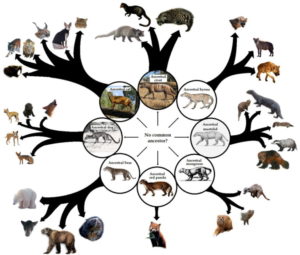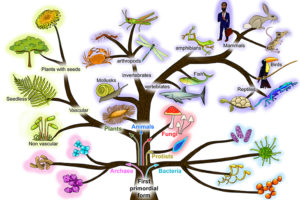Derived from the Biblical Book of Genesis
Baraminology:
A Scientific Taxonomy
Based on Created Kinds
As presented in the book of Genesis. Genesis 1, verses 11, 12, 21, 24, and 25
Baraminology is the study of created kinds, which each appeared separately from one another during Creation Week



ORIGIN OF THE TERM BARAMINOLOGY
Baraminology is a scientific taxonomy based on created kinds rather than presumed natural selection of mutations. It’s based on the pioneering work of the creation scientist Carolus Linnaeus (https://www.britannica.com/biography/Carolus-Linnaeus). Linnaeus taught that new organisms that arose were all derived from the primae speciei (original kinds) and were a part of God’s original plan because He placed the potential for variation in the original creation. Modern biblical creationists still use the concept.
The term baraminology comes from baramin, which was constructed from the Hebrew root words bara (בָּרָא, to create) and min (מִין, kind). The suffix ology of course derives from the Ancient Greek ending -λογία (-logía), “the study of”. The term was coined by American botanist Frank L Marsh in his 1941 textbook Fundamental Biology (https://www.worldcat.org/title/fundamental-biology/oclc/2988889). Marsh first obtained a PhD in botany on plant ecology at the University of Nebraska in 1940.
There are several types of baramin: holobaramin, monobaramin, apobaramin, and polybaramin. Holobaramin is an entire group of living and extinct forms of life understood to share genetic relationship by common ancestry. Monobaramin a group containing only organisms related by common descent, but not necessarily all of them. Apobaramin is a group consisting of the entirety of at least one holobaramin. It may contain a single holobaramin or more than one holobaramin, but it must contain the entirety of each of the one or more holobaramins within it. A polybaramin is a group consisting of part of at least two holobaramins. It may be any of numerous mixtures which could contain holobaramins, monobaramins, apobaramins, and individual specimens.
Because baraminology is a scientific taxonomy based on created kinds, it posits that speciation is results naturally from genetic recombination using existing genetic traits. No new traits, or genes, need be created, eliminating the need for millions of years for beneficial mutations to accumulate. Marsh commented that “The Bible knows nothing about organic evolution. It regards the origin of man by special creation as a historical fact. … In view of the subjectivity of the evidence upon which a decision on the matter of origins must be made, creationist and evolutionist theories should be respected as alternate viewpoints.”